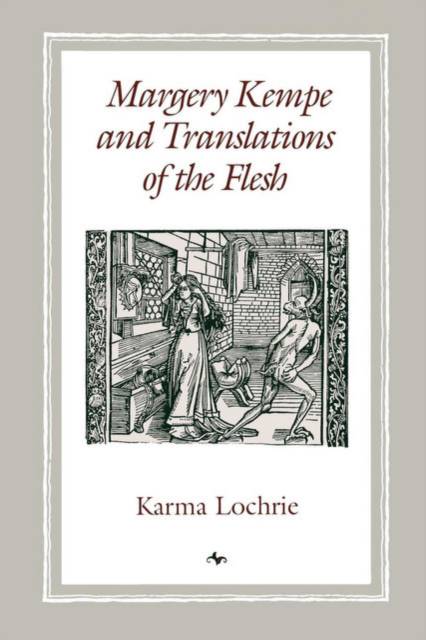
- Retrait gratuit dans votre magasin Club
- 7.000.000 titres dans notre catalogue
- Payer en toute sécurité
- Toujours un magasin près de chez vous
- Retrait gratuit dans votre magasin Club
- 7.000.0000 titres dans notre catalogue
- Payer en toute sécurité
- Toujours un magasin près de chez vous
Description
Margery Kempe and Translations of the Flesh Karma Lochrie "A feminist analysis of the writing of the fifteenth-century English mystic, showing how Kempe exploited the gendered ideologies of flesh and text, violated taboos, and responded to the constraints of her time."--Book News, Inc. Selected by Choice magazine as an Outstanding Academic Book for 1999 Karma Lochrie demonstrates that women were associated not with the body but rather with the flesh, that disruptive aspect of body and soul which Augustine claimed was fissured with the Fall of Man. It is within this framework that she reads The Book of Margery Kempe, demonstrating the ways in which Kempe exploited the gendered ideologies of flesh and text through her controversial practices of writing, her inappropriate-seeming laughter, and the most notorious aspect of her mysticism, her "hysterical" weeping expressions of religious desire. Lochrie challenges prevailing scholarly assumptions of Kempe's illiteracy, her role in the writing of her book, her misunderstanding of mystical concepts, and the failure of her book to influence a reading community. In her work and her life, Kempe consistently crossed the barriers of those cultural taboos designed to exclude and silence her. Instead of viewing Kempe as marginal to the great mystical and literary traditions of the late Middle Ages, this study takes her seriously as a woman responding to the cultural constraints and exclusions of her time. Margery Kempe and Translations of the Flesh will be of interest to students and scholars of medieval studies, intellectual history, and feminist theory. New Cultural Studies 1992 268 pages 6 x 9 4 illus. ISBN 978-0-8122-1557-1 Paper $26.50s £17.50 World Rights Biography, Literature Short copy: "A feminist analysis of the writing of the fifteenth-century English mystic, showing how Kempe exploited the gendered ideologies of flesh and text, violated taboos, and responded to the constraints of her time."--Book News, Inc.
Spécifications
Parties prenantes
- Auteur(s) :
- Editeur:
Contenu
- Nombre de pages :
- 268
- Langue:
- Anglais
- Collection :
Caractéristiques
- EAN:
- 9780812215571
- Date de parution :
- 01-11-94
- Format:
- Livre broché
- Format numérique:
- Trade paperback (VS)
- Dimensions :
- 148 mm x 227 mm
- Poids :
- 421 g

Les avis
Nous publions uniquement les avis qui respectent les conditions requises. Consultez nos conditions pour les avis.






